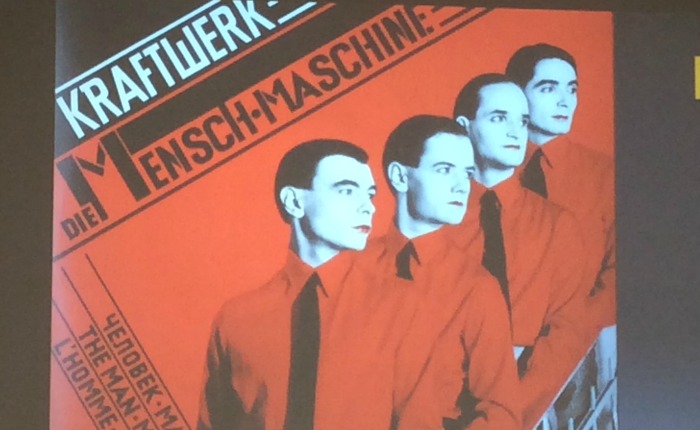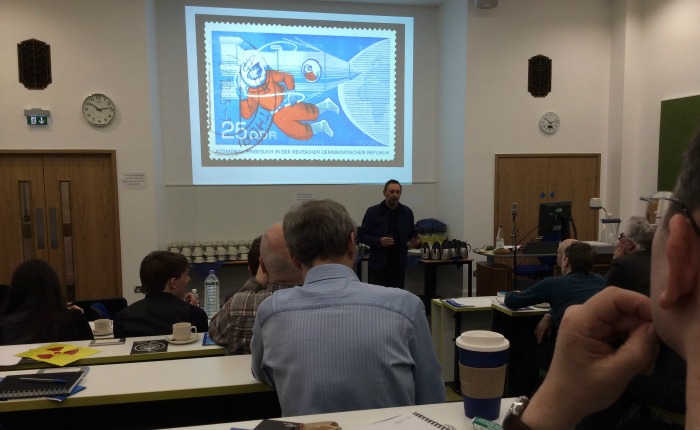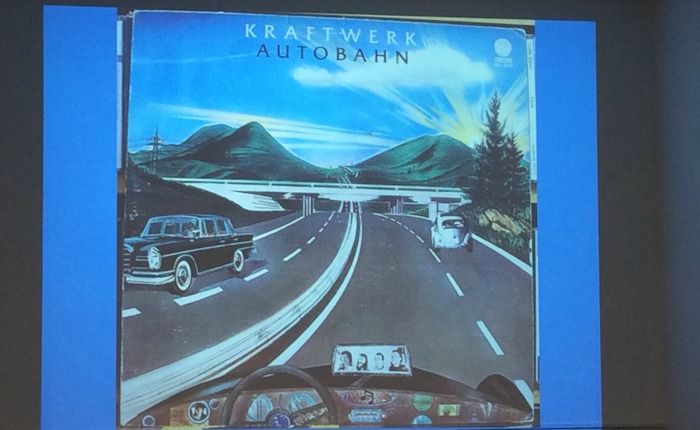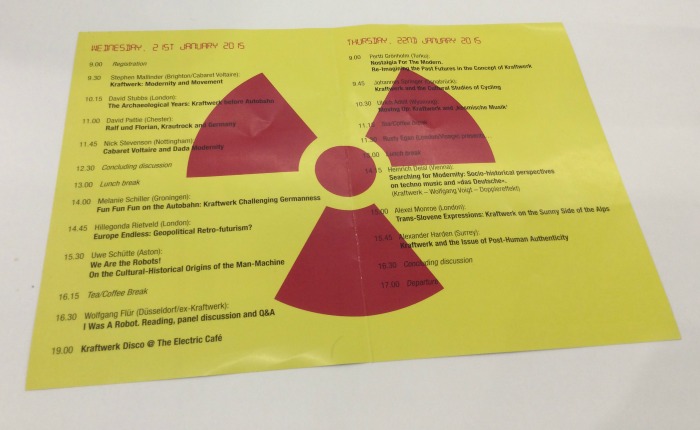We Went to an Academic Conference on Kraftwerk
Kraftwerk‘s pioneering electronic sound—initially coaxed out of primitive ’70s modular synthesizers and today employing state-of-the-art touchscreen technology—is the antithesis of standard build/drop stadium EDM. Yet, the Düsseldorf four-piece is the bedrock upon which the new sound was built, having kick-started the global electronic music revolution by inspiring innovators in the techno and electronic scenes of Detroit and New York.

We attended a two-day academic conference on the group at Aston University in Birmingham, UK. There were many powerpoint presentations. This is what we learned from the attending Kraftwerk scholars:
1. Kraftwerk Originally Looked Like Hippies.
Until their breakthrough album Autobahn, the band still used traditional instruments, such as the flute, and hadn’t fully broken from the long-haired look of the Krautrock scene. Though once derogatory, the genre label is now widely used to refer to experiential bands formed in the ’70s, such as Neu! and Can, who wished to break away from the overbearing influence of Anglo-American rock, as well as from the stereotype of Germans as neat and orderly.
2. Kraftwerk Helped Reset Post-War German Culture.
Coming of age in the ‘60s and ‘70s, Kraftwerk arose as a de facto part of their country’s zero hour, born into a generation seeking to assert a new German culture. In the words of Kraftwerk lead singer and founding member Ralf Hütter, they “represent the generation with no fathers.” This is why their music and lyrics combine futurism and technology with a nostalgia for 1920s German culture, such as Bauhaus style and traditional music.

3. Kraftwerk Is Funny.
Kraftwerk’s outward seriousness was a cover for their dry humor. Their famous iconic image played up to German stereotypes (even incorporating the Nazi-affiliated red/black/white colors in a bid to reclaim them), while the German lyrics to “Autobahn” sound like they’re singing “Fun, Fun, Fun”—a wry reference to one of their favorite bands, the Beach Boys. After they went fully electronic, Hütter liked to remark, “Our drummer doesn’t sweat.” Sure, it’s not lol-style humor, but they’re having more fun than they let on.
4. Kraftwerk Loves Cycling. Like, Really Loves Cycling.
This may be obvious—after all, they wrote “Tour de France.” They also performed at the Manchester Velodrome in 2010. And their sterile, almost inhuman onstage image was allegedly punctured whenever they turned up to record company meetings sweating because they’d cycled miles to get there. Cycling was their favorite mode of travel, since it mixed man and machine with nature (another of their ongoing fixations).
5. But Kraftwerk Doesn’t Love Star Wars.
Hütter believed that the soundtrack, scored by iconic composer John Williams, revealed it as a sci-fi Western, rather than true science fiction. Whether or not Kraftwerk enjoyed The Phantom Menace was not discussed.
6. Kraftwerk Influenced David Bowie.
Bowie’s 1977 album Low, written when he moved to West Berlin, was influenced by Krautrock and Kraftwerk, with whom he nearly collaborated. Bowie appears in both the lyrics and video to one of the group’s most famous tracks, “Trans Europe Express,” along with Iggy Pop. (Fun fact: The model buildings in the video are an homage to German filmmaker Fritz Lang’s 1927 classic Metropolis, which featured the first cinematic robot.)

7. Actually, Kraftwerk Influenced Everyone.
Providing a model for aspiring British industrial bands such as Cabaret Voltaire, and sampled by Afrika Bambaataa on his 1982 breakdance classic “Planet Rock,” Kraftwerk’s pure electronic template inspired synth-pop, techno and electro. These genres, of course, evolved into most modern music being made on computers. Kraftwerk’s sphere of influence is so notable, in fact, that it’s more significant when someone (the Prodigy’s Liam Howlett) claims they weren’t influenced by them.
8. Kraftwerk Enthusiasts Are Next-Level Fanboys.
While Daft Punk fans are known to be hardcore, Kraftwerk fans are on a whole other level. The conference included a thorough deconstruction of everything about the band’s identity: We got an in-depth analysis of the cover of Autobahn in Melanie Schiller’s “Fun Fun Fun on the Autobahn: Kraftwerk Challenging Germanness,” while London-based scholar Alexi Monroe concentrated on their influence in Slovenia in “Trans-Slovene Express: Kraftwerk on the Sunny Side of the Alps.” Sadly, we all missed “Kraftwerk and the Cultural Studies of Cycling” when presenter Johannes Springer called in sick.

9. Even a Kraftwerk-Themed Disco Is Not Safe From Requests.
Rusty Egan—founder of famous ’80s band Visage and DJ at the seminal English new romantic club the Blitz—DJed the party following the first day of the conference. He announced that he’d prepared 100 tracks from Kraftwerk and bands indebted to them. Yet, he still got a request to play a song by… Gypsy Kings!
10. Kraftwerk Is Mysterious.
Very little is known about the private lives of the band members, who prefer to let their onstage persona and music speak for them (they rarely even address the audience during performances, letting a robotic announcer welcome them onstage). This made it a very big deal when ex-Kraftwerk member Wolfgang Flür was announced as a guest of the conference, attracting BBC coverage and an audience of hundreds and creating a huge sense of anticipation—not to mention a huge mystery when, with no word of explanation, he failed to board his plane from Germany. Scheisse.
Follow Kraftwerk on Facebook | Twitter


